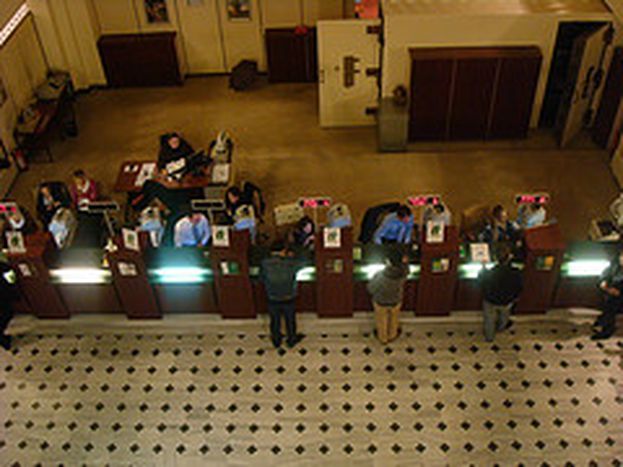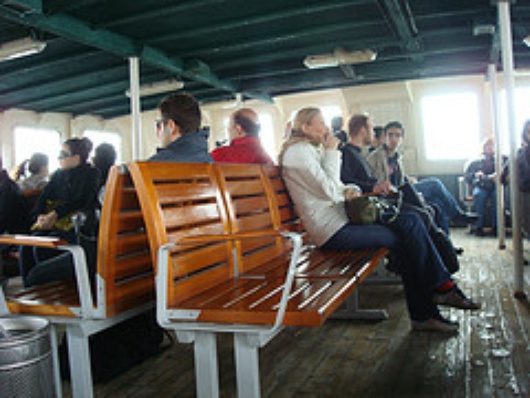
What we earn, and how
Published on
Not only, but also because the government currently debates the social security of workers in Turkey, it is worth looking at how people in this country actually make their living.
To me the situation seems like this:
On the one hand, there are those who carry home these amazing amounts of money every months that I am always completely stunned whenever my attention is pulled towards it: from what I hear some columnists earn $ 25.000. Mind you, we are talking about US Dollar. And we are talking about monthly wages! (A young Turkish reporter starts on average with 500 Lira a month, experienced reporters earn around 2000 Lira.) Among them are the owners of huge holdings along – about a handful in the country – with their usually top-positioned relatives within the family empires. Their earnings make about two thirds of all the generated money as those mega entrepreneurs usually not only own construction firms and chocolate factories. Along with that they have gas stations (to avoid subcontract supply), banks (the money needs to go somewhere) and newspapers (advertisement must go somewhere and you don’t want others to form people’s opinions). They pay more taxes every year than the average Turkish workers earns in a lifetime. Once a year these economic big shots are celebrated for the millions of lira they give to the state (top of this year’s list is Aydın Doğan with over 10 million lira taxes). Part of the upper income league are also doctors (unless they work for state hospitals). Also politicians and all those in their favour. Who else? University professors and lawyers certainly not.
Then there is a big nothing, or a thin lawyer of what is usually called upper middle-class. Many of those I spoke with earn something between 1000 and 2000 YTL a month, which currently equals about 500 to 1000 Euro. I have never stopped wondering how people manage to lead a decent life with this kind of money in a city like Istanbul where (unlike most people think) the costs of living are comparable with any other big European city, and definitely much cheaper than for example Berlin. A decent small apartment (well, windows is not too much to ask, is it?) almost anywhere in the city costs on average 700 YTL, in the nicer areas you quickly pay twice the amount. Gas and electricity are getting more and more expensive. Most people don’t even dare to think about higher rent apartments. Their dream of having their own apartment concludes when they receive their first salary.
Surprisingly many people don’t seem to make a drama out of this situation. Instead of buying their own flat they move in with their parents, their siblings, friends or spouses. Together things work out. And after all isn’t it nice to have breakfasts and dinners together?
A wonderful thing about the Turkish society is that friends and family immediately and without batting an eye pitch in and help if someone is hard-pressed for money (as long as the person in need is not a hopeless player or went into depth out of pure laziness). I have never seen a society which is more willing to help and to make sacrifices than this one here in Turkey when it comes to supporting someone in lack of money – maybe because he or she has a boss who pays salaries which is enough to render anyone sleepless, or because his or her own company went bankrupt. Few environments allow such a soft landing when the bank accounts suddenly show zero and worse – given that you have good friends or family. Some money will always come up, some money can always be borrowed, no matter what the balance of your friends’ own accounts is. Apparently even the parties of multi-family houses sometimes gather money (anonymously) for their broke neighbour, given that he or she had really given their best is now doing everything to get a new job. (Unlike in Germany, the entrepreneurial approach is always appreciated even if it failed.)
Unfortunately and regrettably, however, this willingness to help is often brazenly exploited by those who do not want to pay appropriate fees and salaries. As a reporter for a large Turkish newspaper you start – from what I was told – with about 500 to 800 YTL (please let someone prove me wrong!). While it is definitely adorable that friends and family step in when help is needed, it should not be forgotten that good work is worth good money, my dear bosses, the responsibility lies with you!
Highly irritating is also an attitude à la “You go ahead and start working and later I’ll tell you how much I think it’s worth.” This is not a made-up example. Of course we need to talk and negotiate about money – but, please, before starting the job. Also, the money that was agreed should actually be paid. From the top of my head I now at least half a dozen cases where people waited for weeks to receive their payments and eventually quit without any hope of ever going to see their money.
 As a freelance journalist I have personally encountered further examples of brazenness: “We like your story ideas. Please go ahead and write something on that topic for us. Unfortunately, however, we cannot pay for freelance contributions.” Hello? That’s my job! How am I suppose to make a living? From what Turkish colleagues tell me this incident is not a single case in the Turkish media world – well, it also occurs in most other countries but at least if you write for large publications you will get at least some money. Small ambitious magazines, meaningful but profitless, are a different story).
In my own case we eventually agreed on a ridiculous sum of money to be paid for my contributions. A beginning. Though I will only be able to afford this work – while money negotiations are continuing – as long as I have other jobs that allow me to sustain myself. When asked how other contributors to this magazine manage to survive, one editor told me: they either have other jobs or rich husbands (sometimes, rarely, the wives are the money makers).
As a freelance journalist I have personally encountered further examples of brazenness: “We like your story ideas. Please go ahead and write something on that topic for us. Unfortunately, however, we cannot pay for freelance contributions.” Hello? That’s my job! How am I suppose to make a living? From what Turkish colleagues tell me this incident is not a single case in the Turkish media world – well, it also occurs in most other countries but at least if you write for large publications you will get at least some money. Small ambitious magazines, meaningful but profitless, are a different story).
In my own case we eventually agreed on a ridiculous sum of money to be paid for my contributions. A beginning. Though I will only be able to afford this work – while money negotiations are continuing – as long as I have other jobs that allow me to sustain myself. When asked how other contributors to this magazine manage to survive, one editor told me: they either have other jobs or rich husbands (sometimes, rarely, the wives are the money makers).
So this goes out to you, my dear richly married ladies (and occasionally gents), those of you who may only want to see their names printed and who don’t seem to need the couple of hundred lira, not even for the sake of your pride. You ruin the prices with your journalistic hobby. And the quality.
Dorte HUNEKE



